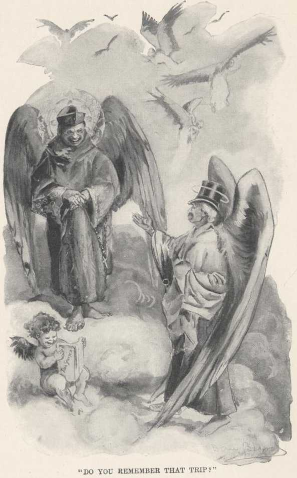On the rail again—bound for Bendigo. From diary:
October 23. Got up at 6, left at 7.30; soon reached Castlemaine, one of the rich gold-fields of the early days; waited several hours for a train; left at 3.40 and reached Bendigo in an hour. For comrade, a Catholic priest who was better than I was, but didn't seem to know it—a man full of graces of the heart, the mind, and the spirit; a lovable man. He will rise. He will be a bishop some day. Later an Archbishop. Later a Cardinal. Finally an Archangel, I hope. And then he will recall me when I say, "Do you remember that trip we made from Ballarat to Bendigo, when you were nothing but Father C., and I was nothing to what I am now?" It has actually taken nine hours to come from Ballarat to Bendigo. We could have saved seven by walking. However, there was no hurry.

Bendigo was another of the rich strikes of the early days. It does a great quartz-mining business, now—that business which, more than any other that I know of, teaches patience, and requires grit and a steady nerve. The town is full of towering chimney-stacks, and hoisting-works, and looks like a petroleum-city. Speaking of patience; for example, one of the local companies went steadily on with its deep borings and searchings without show of gold or a penny of reward for eleven years—then struck it, and became suddenly rich. The eleven years' work had cost $55,000, and the first gold found was a grain the size of a pin's head. It is kept under locks and bars, as a precious thing, and is reverently shown to the visitor, "hats off." When I saw it I had not heard its history.
"It is gold. Examine it—take the glass. Now how much should you say it is worth?"
I said:
"I should say about two cents; or in your English dialect, four farthings."
"Well, it cost L11,000."
"Oh, come!"
"Yes, it did. Ballarat and Bendigo have produced the three monumental nuggets of the world, and this one is the monumentalest one of the three. The other two represent L9,000 a piece; this one a couple of thousand more. It is small, and not much to look at, but it is entitled to (its) name—Adam. It is the Adam-nugget of this mine, and its children run up into the millions."
Speaking of patience again, another of the mines was worked, under heavy expenses, during 17 years before pay was struck, and still another one compelled a wait of 21 years before pay was struck; then, in both instances, the outlay was all back in a year or two, with compound interest.
Bendigo has turned out even more gold than Ballarat. The two together have produced $650,000,000 worth—which is half as much as California produced.